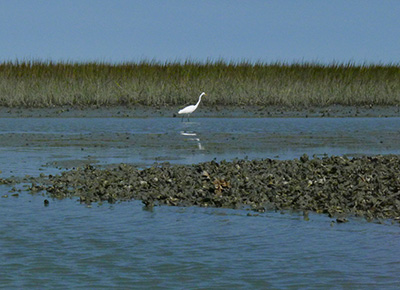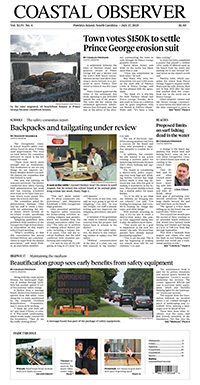Environment
County faces suit over Murrells Inlet water quality

Murrells Inlet residents gave notice to Georgetown County last week that they are ready to go to court to enforce compliance with federal regulations that require the county to improve water quality in the estuary.
If that happens, it will be the first action in the state to challenge compliance with federal permits for “municipal separate storm sewer systems,” known as MS4s, according to Amy Armstrong, executive director and chief counsel of the S.C. Environmental Law Project, which is representing the citizens group Preserve Murrells Inlet and Murrells Inlet Seafood.
Georgetown County is one of 70 small MS4s in the state that operate under federal permits administered by the state. The Department of Health and Environmental Control notified the county last April that an audit of its MS4 program found deficiencies. That included the failure to show that it had implemented a 2014 plan to reduce the amount of pollutants entering the Murrells Inlet watershed.
“Georgetown County is not some sort of outlier. We’ve seen it in other places, but not as well documented,” Armstrong said.
The MS4 is part of the county’s stormwater management plan, which went into effect in 2007 under a federal mandate. In addition to issuing stormwater permits for development, the county was required to create a plan for bringing water bodies into compliance with water quality standards. Murrells Inlet was already on the list of waters that didn’t meet those standards because of high levels of fecal coliform bacteria found in shellfish.
“Community members have expressed their concerns to both the County and DHEC regarding the current state of the County’s stormwater program and the resulting effects on shellfish waters,” according to the notice sent to the county.
Under the federal Clean Water Act, citizens are able to bring suit after providing 60 days notice of violations.
County Administrator Anglea Christian said the county is reviewing the notice, but was unable to comment further.
The DHEC audit of the county MS4 program also found that it was lax in its permitting and enforcement, citing 10 violations at the site of the Sunnyside Village development in Murrells Inlet. Those included failing to enforce “best management practices” to reduce stormwater runoff as required by the MS4 permit.
The audit also noted that while the development permit for the project was issued in early October 2021, the first inspection didn’t occur until late January 2022. Monthly inspections are required under the MS4 permit.
Sunnyside Village was the focus of an “independent compliance audit” by Preserve Murrells Inlet that was sent to DHEC.
While the S.C. Environmental Law Project has been tracking other small MS4 permits for compliance, “we have a robust amount of documentation in Georgetown County,” Armstrong said.
That is all cited in the notice sent to the county.
“This is what we would be telling a federal court,” Armstrong said.
After the DHEC audit, the county acknowledged that it needed to improve its inspection and enforcement. As for reducing pollutants entering the inlet, the county said it had been conducting the required monitoring and would include data in future reports. In included an example of the data, which was compiled by a consultant in 2020.
The notice of intent states that the county’s 2023 MS4 report merely repeated its previous claims that it was doing monitoring.
“The County has not assessed or analyzed trends in the monitoring data, despite the fact that long-term data is available, nor has it prioritized the area targeted for BMP implementation or provided underlying rationale,” the notice says, referring to best management practices.
The federal permit requires the county to change its plan for managing the “total maximum daily load” of pollutants if it can’t show improvements in water quality.
“It is crucial that the county provide this data,” the notice states.
It also notes that a vegetated wetland that was built by the county with a federal grant and intended as a best management practice to filter pollutants from stormwater was never inspected or maintained.
The shortcomings in the county MS4 program and its reporting “is evidence that staffing levels are not sufficient,” the notice states. The county’s annual MS4 reports says there are six staff members who work with the stormwater program.
The report also says the county is implementing best management practices and that “indicates progress towards reducing the discharge of pollutants.”
The notice says the county hasn’t done anything to reduce the discharge of pollutants since 2017 and “these projects have long-since been abandoned.”
Providing notice before filing suit gives the county an opportunity to make changes, Armstrong said.
“We need to see some concrete evidence that there will be pretty substantial changes made,” she said.
Leon Rice, president of Preserve Murrells Inlet, isn’t optimistic.
“They’re not taking it seriously,” he said of the county MS4 program. “We’ve tried to talk to the county about trying to get them to do their duty.”
Rick Baumann, owner of Murrells Inlet Seafood, served on a stakeholders committee that was formed in 2005 to help draft the county stormwater management plan. He argued at the time that it needed a water quality monitoring component.
That was left out because officials feared a stormwater program that was too aggressive would be too expensive to operate and restrict the ability of people to build on their property.
“We’re going to get sued,” the chairman of the Planning Commission said at the time.
Baumann said he hasn’t seen any change in the county’s attitude toward water quality.
“They promised no further degradation,” he said, but didn’t want to compile the baseline data that would allow that to be measured. “Thirty percent of the inlet’s closed right now because of fecal coliform.”
“Our inlet’s precious,” Rice said. “This is kind of a last resort to get the county to do right.”




